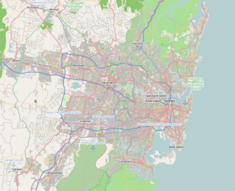| St John's Cemetery, Parramatta | |
|---|---|
 | |
| Location | 1 O'Connell Street, Parramatta, City of Parramatta, New South Wales, Australia |
| Coordinates | 33°49′01″S 150°59′54″E / 33.8169°S 150.9984°E |
| Built | 1790– |
| Website | stjohnsonline |
| Official name | St. John's Anglican Cemetery; First Fleet Cemetery; Saint Johns Cemetery; St Johns Cemetery |
| Type | State heritage (complex / group) |
| Designated | 2 April 1999 |
| Reference no. | 49 |
| Type | Cemetery/Graveyard/Burial Ground |
| Category | Cemeteries and Burial Sites |
St John's Cemetery, Parramatta, also known as St John's Anglican Cemetery, Saint John's Cemetery, and First Fleet Cemetery, is a heritage-listed cemetery at 1 O'Connell Street, Parramatta, City of Parramatta, New South Wales, Australia.[1]
The cemetery is highly significant as it was established in 1790 as a general burial ground for all religious denominations making it the oldest surviving European cemetery in Australia.[2] It is also significant for being the final resting place of many notables, including over 50 First Fleet graves and well known early European settlers, such as the Reverend Samuel Marsden, his wife Elizabeth, land holder D'Arcy Wentworth and family, land holders and farmers the Blaxland family, Charles Fraser, soldier and colonial botanist, who was appointed the first superintendent of the Sydney Botanic Garden by Governor Macquarie in 1816,[3][4] and colonial bridge builder David Lennox, to name just a few.[1]
It was only when cemeteries dedicated to specific religious denominations were progressively established in Parramatta in the mid-nineteenth century that St John's finally became an Anglican burial ground specifically.[2] The historic cemetery was added to the New South Wales State Heritage Register on 2 April 1999.[4]
- ^ a b "The Significance of St John's Cemetery, Parramatta". St. John's Cemetery Project. 29 November 2016. Retrieved 23 August 2018.
- ^ a b "History of St. John's Cemetery, Parramatta". St. John's Cemetery Project. 16 November 2016. Retrieved 23 August 2018.
- ^ Davies, G., 2004, paraphrased by Stuart Read, 9/8/2013
- ^ a b "St. John's Anglican Cemetery". New South Wales State Heritage Register. Department of Planning & Environment. H00049. Retrieved 1 June 2018.
 Text is licensed by State of New South Wales (Department of Planning and Environment) under CC BY 4.0 licence.
Text is licensed by State of New South Wales (Department of Planning and Environment) under CC BY 4.0 licence.
